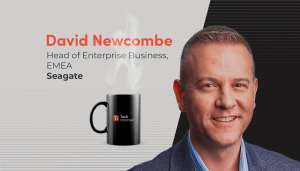

A coffee with… Lydia Pintscher, portfolio lead, Wikidata
When most people think of Wikipedia, they picture millions of articles collaboratively edited and read around the world - but tucked alongside it is Wikidata — an equally ambitious project that often flies under the…
When most people think of Wikipedia, they picture millions of articles collaboratively edited and read around the world – but tucked alongside it is Wikidata — an equally ambitious project that often flies under the radar despite powering innovations in data, research, and public information across the globe.
Wikidata is a vast, freely available knowledge graph built by the same volunteer community that created Wikipedia. But while Wikipedia organises knowledge into articles, Wikidata breaks information down into structured data — carefully curated facts that machines can read and process automatically.
From the population of a city to the mass of the Moon, these pieces of data form a dense, public web of knowledge that anyone can access, reuse, and remix under an open license. It’s like a shared global brain that software can “plug into,” fuelling an array of tools and initiatives.
And this is where Lydia Pintscher comes in. Pintscher is the portfolio lead for Wikidata at Wikimedia Deutschland, the German chapter of Wikipedia — and one of the most passionate voices behind the project.
Joining Wikimedia straight out of university 13 years ago with a computer science degree in hand, Lydia has been part of Wikidata from its earliest days. Today, she oversees its continued growth as well as its diverse contributor community.
Over an artisanal German cola (rather than a coffee) Pintscher talks about the impact that Wikidata can have far beyond the tech world: helping investigative journalists follow money trails, supporting public libraries with accurate data, aiding researchers in tracking scientific contributions, or providing cultural organisations with a solid foundation for preserving heritage.
Why is Wikidata important in an era dominated by big tech?
Trusted, community-owned data matters more than ever. Wikidata is built by the people, for the people, and is free of personal whims or corporate agendas. It gives everyone a reliable baseline of knowledge they can use, remix and build on.
How do you ensure everything on Wikidata is factually correct?
We don’t and we can’t — and neither can Wikipedia — but we put a lot of systems in place to help. Every change is logged and visible, so you can see who edited what and when. Plus, the structured nature of Wikidata makes errors easier to catch, like spotting someone who was supposedly born after they died.
How big is your team?
About 20–30 people, mostly based in Berlin — though I tend to work remotely myself.
What skills matter most in managing Wikidata?
Trust. In an open project like this, you can’t control everything. You must trust contributors to do their part, while providing them the tools and support they need.
Can you give examples of how Wikidata powers innovation in places with limited resources?
A great example is Govdirectory — a community-built site that pulls data directly from Wikidata to list official ministries, contacts and social accounts from countries worldwide. It’s all volunteer-driven and updated continuously, making it easier for people to connect with their governments without spending millions on proprietary databases.
And what about commercial use?
Big tech companies absolutely use Wikidata too — they just rarely shout about it. Our data feeds into enterprise tools all the time, often invisibly.
Do you have a concrete business example?
Wolfram is one example: it’s known for its advanced computing tools like Wolfram Language and Wolfram Alpha.Wolfram Language allows its users to query Wikidata with simple commands — say, looking up the mass of the Moon or all the authors of a book — and pull this data directly into reports and analyses. It’s a great way for companies to put high-quality, up-to-date knowledge into their apps without a team of data scientists.
How is Wikidata helping communities in places like São Paulo and Bangladesh?
In São Paulo, Wiki Movimento Brasil is training students and archivists to digitise historical texts and add them to Wikidata. It’s a hands-on way to preserve cultural heritage. In Bangladesh, volunteers add local libraries, institutions and publications, making sure future tools can access verified data in Bengali.
Do you see many researchers and journalists using Wikidata?
Absolutely. Nonprofit investigative projects like OCCRP (Organized Crime and Corruption Reporting Project) use Wikidata to untangle the many names’ people use across documents — vital for tracking connections across media archives, court files and financial leaks.
Do you want people to credit Wikidata?
It’s not a requirement, but we appreciate it. If people know where the data comes from, they also know they can contribute or correct it — and that’s how Wikidata stays strong.
What are the challenges in running a global, open data project?
There are technical hurdles like ensuring the data scales reliably, and then there’s the human side — managing a worldwide volunteer community with different viewpoints. Keeping everyone engaged and respectful is an ongoing task.
Is there a central place where everyone collaborates?
Most of the day-to-day work happens on Wikidata.org itself, especially in discussion pages. But people also chat on Telegram, Discord and social networks like Mastodon and LinkedIn.
Is Wikidata more gender diverse than Wikipedia, where 80-90% of the contributions are made by men?
Slightly. Wikidata’s smaller, bite-sized contributions — like adding one verified fact — lower the barrier to entry. That appeals to people who might not have time or confidence to write full articles but still want to help. It means more diverse contributors, but we still have a long way to go.
So, there’s still a gender bias in the data?
There is, for two main reasons. First, who contributes — and what they care about. Second, what’s documented in the real world. Wikidata reflects existing sources, so historically under-reported groups, like women, often lack the coverage that others receive.
What can Wikidata do to address this?
We help by making those gaps visible. Projects like Women in Red use Wikidata to identify where we’re missing women’s stories, and that data guides efforts to close those gaps.
How does AI fit into your work?
People sometimes wondered if AI would make knowledge graphs obsolete, but they complement each other. AI can help navigate and process huge datasets; Wikidata provides the structured, verified data they need. Together they produce better answers — especially as we experiment with embedding Wikidata into large language models.
You recently won a European Open-Source award — what does that mean to you?
It’s lovely recognition, but really it celebrates everyone who contributes. Wikidata is often behind the scenes; most people see the apps built on top of our data. Being honoured like this shines a light on the whole community’s work.
Any advice for someone wanting to manage an open data project?
Work in the open. Communities only thrive if they believe you’re transparent and genuinely invested. That means regular updates, public conversations and being approachable.
How do you build that trust?
By showing up. Holding regular office hours, answering questions, sharing what we’re working on — and just being present.
Where do you see Wikidata going in the next five years?
I’d love to see a return to valuing trustworthy, verifiable information. Companies can help make that happen by integrating Wikidata into their tools — creating a healthier, more transparent internet.
And outside of work — how do you switch off?
Beach holidays. Give me a quiet stretch of sand in the Maldives and I’m happy.
Finally, how do you take your coffee?
Confession: I’m more of a cola person. Right now, I’m drinking a Fritz-Kola — made in north Germany by two friends who put their own faces on the bottle.











